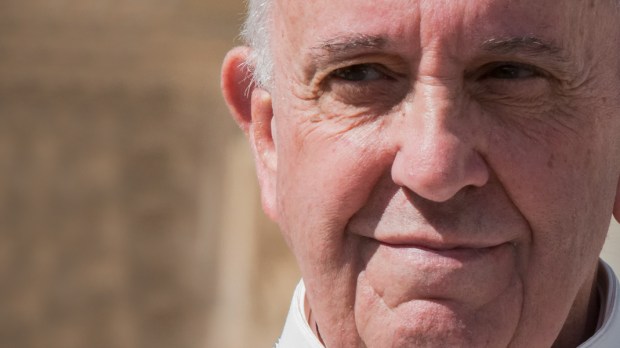VATICAN CITY — True religion isn’t like Wall Street, Pope Francis implied on Sunday. It’s not about making “bargains with God” and “seeking one’s interests” but about “welcoming the revelation of a God who is Father and cares for all his creatures, even the smallest and most insignificant in the eyes of men.”
Addressing pilgrims at the Sunday Angelus in St. Peter’s Square, on the International Day of Leprosy, the Pope called all men and women not to cede to the temptation to treat religion like a human investment, saying: “Privilege in the eyes of God is to have no privilege, to have no ‘godfathers,’ to abandon oneself into the hands of the heavenly Father.
“No human condition constitutes grounds for exclusion … from the Father’s heart,” he said.
After praying the Angelus, the Pope turned his attention to the World Day of Leprosy, calling it a “disease, that while in regression, unfortunately still affects the poorest and most marginalized.”
Stressing the importance of showing solidarity with our brothers and sisters who are disabled as a result of leprosy, the pope assured them of his prayers and pledged his support to those who assist them.
Here below we publish the full text of the pope’s Angelus address.
Dear brothers and sisters,
Today’s Gospel reading takes us once again, as last Sunday, to the synagogue in Nazareth, to the city of Galilea where Jesus was brought up in a family and known by everyone. He, who recently had left to start his public life, now returns for the first time and is presented to the community gathered on Saturday in the synagogue. He reads the passage from the prophet Isaiah, which speaks of the future Messiah, and at the end he declares: “Today this scripture has been fulfilled in your hearing” (Luke 4:21). Jesus’ fellow townspeople, at first were astonished and filled with admiration, then they began to make distorted faces, muttering to each other and saying: “Why does this man, who claims to be the Anointed of the Lord, not repeat here, in his own village, the signs we heard he has done in Capernaum and the neighboring villages?” Jesus then says, “No prophet is acceptable in his own country” (v. 24), and he appeals to the great prophets of old, Elijah and Elisha, who worked miracles for the pagans to denounce the unbelief of their people. At this point, those who are present feel offended, they become indignant, they rise up and put Jesus out of the city, and would have liked to throw him down headlong into the precipice. But he, with the strength of his peace, “passing through the midst of them, went his way” (v. 30). His hour had not yet come.
This Gospel passage from the Evangelist Luke is not simply the story of a feud between neighbors, roused by envy and jealousy, as sometimes happens even in our neighborhoods. Rather, it highlights a temptation to which the religious man is always exposed — to which we are all exposed — and from which we need to distance ourselves. And what is this temptation? It is the temptation to treat religion like a human investment and, therefore, begin to “bargain” with God, seeking one’s own interests. Instead, true religion is a matter of welcoming the revelation of a God who is Father, and cares for all his creatures, even the smallest and most insignificant in the eyes of men. The prophetic ministry of Jesus is this: to proclaim that no human condition constitutes grounds for exclusion — no human condition may be reason for exclusion — from the Father’s heart, and that the only privilege in the eyes of God is to have no privileges. The only privilege in the eyes of God is to not have privilege, to have no “godfathers” and to surrender oneself into his hands.
Today this Scripture has been fulfilled in your hearing (Luke 21). The “today” proclaimed by Christ on that day is true in every age. It also resounds for us in this square, reminding us of the relevance and need for the salvation Christ brought to humanity. God comes to meet men and women in every time and place, in the concrete situations in which they find themselves. He also comes to meet us. He always takes the first step: He comes to visit us with his mercy, to lift us from the dust of our sins. He comes to extend his hand to draw us out from the abyss into which our pride has made us fall, and he invites us to welcome the consoling truth of the Gospel and to walk on right paths. He always comes to visit us, looking for us.
Let us return to the synagogue. Certainly that day, Mary, the Mother, was in the synagogue of Nazareth. We can imagine the echoes of her heart, a small preview of what she would suffer under the Cross, seeing Jesus, there in the synagogue, first admired, then challenged, and then insulted and threatened with death. She kept all these things in her heart full of faith. May she help us to be converted from a God of miracles to the miracle of God, which is Jesus Christ.
Diane Montagnais Rome correspondent for Aleteia’s English edition.

